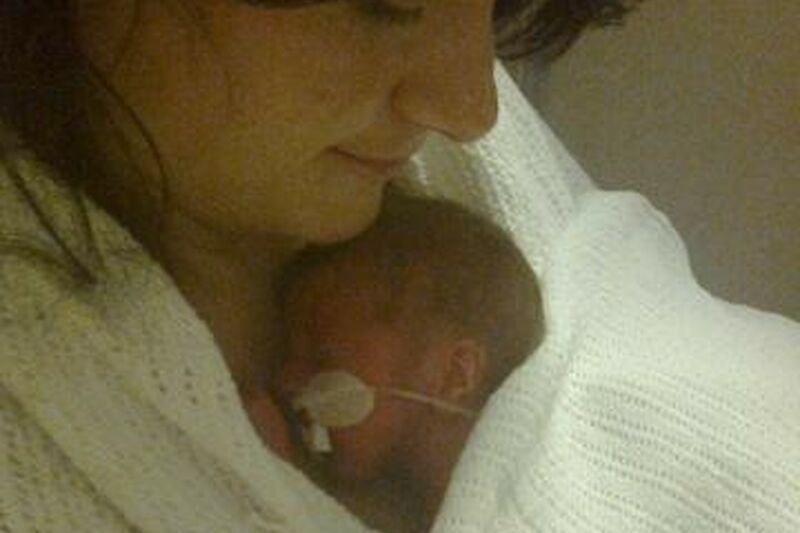At around 20 weeks into my fifth pregnancy I felt that something wasn't right, as I felt bigger than my dates. My midwife examined me and I measured what I should have at 34 weeks. At 22 weeks I started to get contractions and after being admitted to hospital they discovered I had much more amniotic fluid than usual at that point.
The next seven weeks were spent mostly in hospital having amnioreductions (draining of the fluid) and also being given steroids to help the baby's lungs to mature, as well as pain relief and anti-sickness drugs. I was unable to keep food and water down because my stomach was being compressed by my uterus. I had a total of four amnioreductions, which drained 23 litres of fluid.
The day before I was 29 weeks pregnant, I had a foetal fibronectin test to see if I was likely to start labour any time soon. It came back positive and I was taken straight to the labour ward, as I was having contractions. At this point, they measured the height of my uterus and it was 56 cm (usually a full term pregnancy measures 40 cm!) After 20 hours on the labour ward I got the urge to push but they discovered that the baby was breech, so decided to perform a caesarean. On the way to theatre I also had a placental abruption (where the placenta comes away from the lining of the womb).
When Harry was delivered I only caught a glimpse of his feet as they took him away. I didn't get to see him again until the next day. When I saw him for the first time I was terrified that he wouldn’t pull through. All my maternal instincts were telling me to help him, to make everything ok, but his survival was in someone else's hands.
Harry was a good size at 4lb 4oz, but quite a lot of that weight was due to him carrying extra fluid because of a kidney disorder. He had tubes and wires everywhere and there were lots of beeps and alarms sounding. I remember hearing an alarm and being relieved to find that it wasn't Harry, but I then felt guilty because I didn't know if that meant I was happy that someone else's baby had an alarm going off. There were so many alien emotions in those first days.
My partner, Lee, and I both felt anxious and helpless. Harry is Lee's first child, so it was quite an introduction to parenthood. Harry was on a ventilator for three days, then CPAP (assisted breathing) and finally low flow oxygen. We didn't get to hold Harry until day six, and although I was terrified to hold such a vulnerable baby, the moment he finally lay in my arms is something I will never forget. My perfect moment. We had skin to skin contact, and it also really helped my milk production.
The doctors started to become concerned because Harry had polyuria (excessive amounts of urine) and an electrolyte imbalance, but they were mystified as to what was wrong with him. They contacted Bristol Children's Hospital and Great Ormond Street for advice from their kidney specialists. Eventually we heard the term Bartter Syndrome.
On day ten I was ready to go home. Leaving Harry behind was one of the hardest things I have ever done. Every fibre of my being wanted to care for my new baby, but I had to walk away and leave him. It took every ounce of strength I could find to get in the taxi to go home. In those early days, I would do a lot of crying in the bath as I didn't want my other children to see me upset. I found the Bliss handbook very useful at this time. Knowing that other people had gone through similar experiences (and worse experiences) helped me through the dark days.
When Harry was five weeks old Lee had to return to Northampton to work (he had taken extended paternity leave). He found the last visit with Harry very emotional, as he knew it would be several weeks before he would see him again. I have no idea how he found the strength to say goodbye.
With support from the NICU staff and advice from the Bliss booklet, I felt confident about trying to breastfeed. I was able to put Harry to the breast at what would have been 32 weeks gestation. After a few attempts he latched on and it was such a fantastic feeling. All those hours of expressing milk were worth that one moment! I was not able to breastfeed exclusively because Harry needed to have several medicines added to his milk.
After 63 days in NICU Harry came home. I was incredibly anxious about him coming home, especially as he was still having low flow oxygen, but I soon got the hang of having cylinders and tubing everywhere. It was amazing to have our little man home and with the whole family at last.
Harry has been diagnosed with Bartter Syndrome, a rare genetic kidney disorder. It affects around one in a million people. He takes several medications and is in and out of hospital on a regular basis. Most of the time he is well, but sometimes he is a very sick little boy, and we once again have the beeping of machinery and tubes and wires everywhere. He has hearing and speech issues and we are currently learning sign language to help with communication. Harry is an incredible little man, and he has so far had quite a journey!
